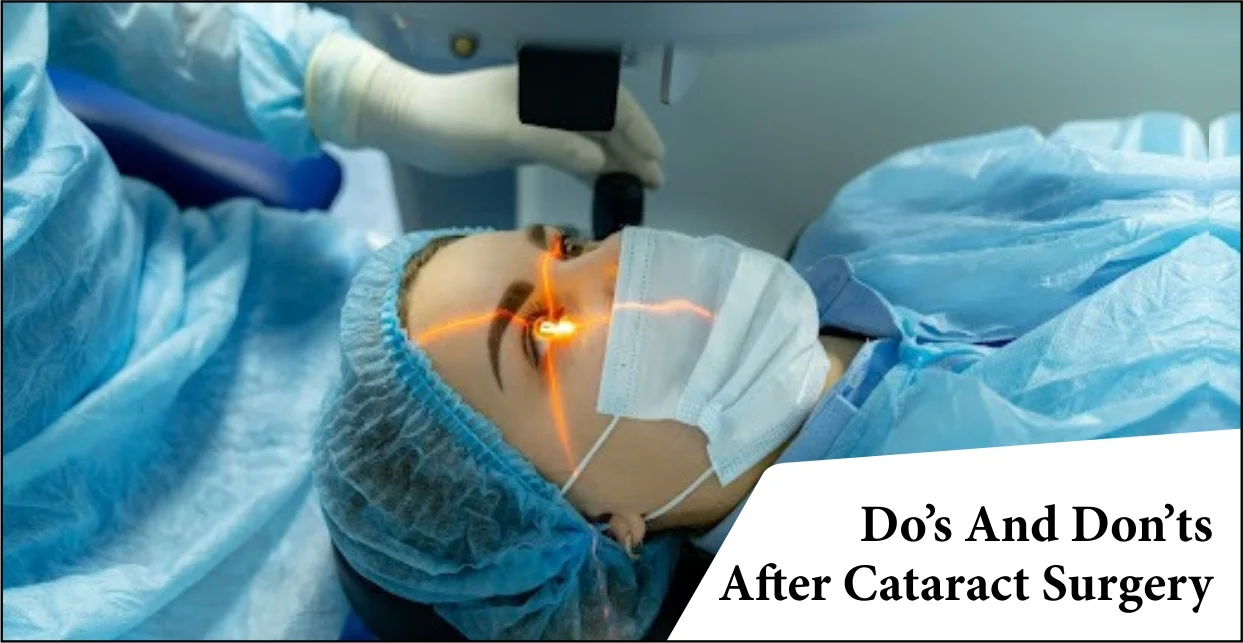If you recently had cataract surgery, you might be pleased that it’s done, but you should keep in mind that your healing process is still ongoing. If you visit a respected eye hospital like Eye-Q Eye Care Hospital, you may be certain that cataract surgery is both safe and very successful.
Nonetheless, there are some dos and don’ts to remember to guarantee a secure and fruitful recovery process following cataract surgery. At Eye-Q Eye Care Hospital, we advise our patients to remain educated about the procedure and not allow their anxiety or dread of the operation to increase their worry.
By being aware of what things are safe for your eyes, you may reduce the likelihood of difficulties along the road and resume your regular daily routines as soon as feasible.
Do’s After Cataract Surgery
- Apply Eye Drops As Directed
- Following cataract surgery, ocular drops will be administered to you to help with healing and prevent infection. Use them exactly as directed, applying them to the affected eye with clean hands. Maintain a 15 minute interval between different eye drops. The patients attendant should administer eye drops after proper hand washing and sanitization.
- Your consultant will advise you on the best time to begin taking your eye drops; however, this is often the morning after the surgery. Until your post-operative consultation, when your specialist will advise when you can stop, you should keep using them.
- Avoid Laborious Activities And Get Proper Rest
- For the initial two or three days after the procedure, you have to relax and take it easy. Resume activities like reading writing and watching TV after two three days or as advised by a doctor. Avoid kitchen work for one week. Avoid engaging in physically demanding tasks during this period, such as housework or exercise. Avoid lifting heavy weights, exercising, heavy workouts, yoga, forward bending and stretching. Your eyes will have the time to recover as a result of this. During this period, you can still read, watch TV, and use your computer. Your expert will give you specific advice on how long to avoid physically demanding activities.
- When Outside, Use Eye Protection Or Glasses
- Wearing a shield to protect your eyes will aid in their healing process. After the operation, you should utilise them for at least a week. Your consultant can provide you with more advice. Wear your eye shield at all times, but especially at night, to avoid scratching your eyes while you sleep. After cataract surgery, it’s also recommended that you wear sunglasses or a shield to protect your eyes from wind, pollen, and sunlight.
- When Necessary, Use Painkillers
- Your cataract surgery will probably not hurt, but following the process, it’s common for individuals to feel uncomfortable, grittily, and like their eyes are watering. Fortunately, they shouldn’t stay too long, although over-the-counter medicines might be helpful if you wish to reduce these sensations.
- Take A Shower And Bathe As Normal
- Following cataract surgery, you will be allowed to wash and take a bath as usual. You maybe below the neck starting the day after surgery. Just be careful not to get any water or irritants—like shampoo or soap—into your eyes. For the first two weeks, wipe your face with water rather than splattering it on it. Do not touch the operated eye with any cloth, handkerchief or towel. Instead, Use gauze or sterlized cotton wool dipped in water to gently wipe the inside of your treated eye, then move it to the outer corner. Refrain from cleaning the inside of your eye, rinsing it out with water, or applying pressure on it. Before washing your eyes, don’t forget to wash your hands.
Also Read:- Do’s And Don’ts Before Cataract Surgery
Don’ts After Cataract Surgery
- After Surgery, Don’t Drive Home
- Driving following cataract surgery should be avoided. This implies that after your procedure, you could need to make arrangements for a ride home. It should take your eyes three to four days to go back to this state. Your eye doctor will be able to evaluate your eyesight during your post-operative visit and provide you with an estimated time of return to driving.
- When Your Eyes Are Healing, Do Not Rub Them
- Although it might seem alluring to touch your eyes following cataract surgery, doing so can hinder the healing process and raise your risk of infection. During the early stages of your recuperation, try not to contact your eyes as much as you can. Mild pain, burning and watering are normal. Blurriiness after bandage removal may resolve within 2-3 days due to air bubbles or swelling; remain calm and do not panic.
- Do Not Get Irritants In Your Eyes
- When your eye is recovering, it is more vulnerable to the effects of wind, pollen, dust, smoke, soap, and sunshine. Remember to use your eye shield, simple glasses, or sunglasses as necessary to prevent this. In the initial days following your treatment, this is especially useful while you’re outside.
- Do Not Apply Eye Makeup For The First Few Weeks
- Following cataract surgery, it is advised that you refrain from wearing eye makeup for approximately four weeks. There’s always a chance that debris from your eye makeup might wind up getting into your healing eye, even with the most careful application. This will not only irritate, but it may also lead to an infection.
- Don’t Swim, or Use Saunas Or Hot Tubs
- While recovering, you should stay out of saunas, hot tubs, and swimming pools. This is because water might harbour germs that could induce an eye infection. It is advised that you refrain from swimming for four to six weeks after your procedure. Swimming is considered a demanding sport following cataract surgery, in addition to the danger of irritants and infection. For more details on when you may resume swimming following the treatment, speak with your doctor.
Also Read:- Precautions After Cataract Operation
How Can We Help?
You can rely on Eye-Q Eye Care Hospital to help you through the whole process, from first consultations to the actual treatment of cataracts and beyond. Our cataract surgery specialists give you the best treatment possible, taking care of your general health and well-being and creating a supportive, caring environment.
To schedule a consultation or to learn more about what to do or not do following cataract surgery, contact us right now. You will receive assistance from our caring eye professionals both before and after your cataract surgery.
Conclusion
You need to make every effort to facilitate a smooth healing process for your eye following cataract surgery. There are many factors to take into account, but you will be well on the path to healthy eyes and significantly better vision if you adhere to your post-operative instructions, refrain from intense exercise, and shield your eyes from physical contact and debris.
FAQ’s
1. How Long To Wear Eye Shield At Night After Cataract Surgery?
After you have your cataract surgery done, it’s recommended that you use the protective eye shield when you sleep. This is to be followed for at least one week following your cataract surgery. This prevents you from potentially rubbing your eye or putting pressure on it while you sleep. Your eye has to heal, and even light touching could disrupt the healing process. It may feel awkward at first, but it’s a tiny step that’s huge in your healing. If you experience any discomfort or have any queries while using the shield, do not stop; just reach out to us. We at Eye-Q Superspeciality Eye Hospitals are here to help you heal in comfort so that your recovery process gets smoother without any difficulties.
2. What Precautions To Be Taken After Cataract Surgery?
After getting your cataract surgery done, it is important that you remain mindful and follow a few easy steps that can help your eye stay protected and heal faster. Firstly, do not rub your eyes, lift anything heavy, or bend for a couple of days. Continue with the eye drops as prescribed, and wear the eye shield while you are asleep. Avoid exposing your eyes to dust, wind, and direct sunlight outside, and wear sunglasses. Also, you should try to avoid swimming for a few days. Along with that, eye makeup should be something you should not do at any cost because it can affect your surgery results and irritate the area. Last but not least, refrain from splashing water directly onto your eyes so that you do not mess up the treated area.
3. When To Remove Bandage After Cataract Surgery?
It is recommended that you leave your bandage on after your cataract operation for 4 to 6 hours or as recommended by your eye surgeon. Once that time is over, you can gently take it off at home, but be sure your hands are clean and don’t touch your eye directly. Use the eye shield at nightwear for a few days in bed after the bandage is removed. At Eye-Q Superspeciality Eye Hospitals, we offer comprehensive aftercare instructions so you’re never in doubt about what to do next.




